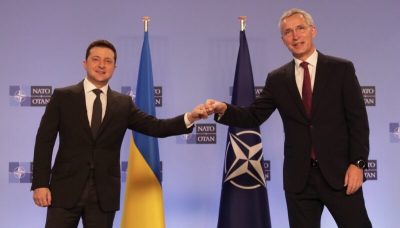NATO’s Phony (and Dangerous) Nonbelligerent Status Regarding the Ukraine War

All Global Research articles can be read in 51 languages by activating the Translate Website button below the author’s name.
To receive Global Research’s Daily Newsletter (selected articles), click here.
Follow us on Instagram and Twitter and subscribe to our Telegram Channel. Feel free to repost and share widely Global Research articles.
***
U.S. leaders and their media allies have fostered numerous, self-serving myths about the war in Ukraine. One myth is that Russia’s February 2022 invasion of Ukraine was entirely unprovoked, since NATO’s expansion to Russia’s border was not a hostile act. Another fable is that Ukraine is a freedom-loving democracy. Still another is that the Russia-Ukraine war is not merely an ugly turf fight between 2 corrupt, autocratic regimes, but is instead part of an existential global struggle between democracy and authoritarianism. Failure to sustain “democratic” Ukraine, the story goes, would jeopardize the entire “rules-based international order.”
US and NATO officials likely do not believe a word of those arguments, even as they avidly circulate such propaganda. However, they do seem to subscribe to another, more dangerous myth: that the Alliance can provide ever greater amounts of financial aid and more powerful weaponry to Ukraine without becoming an active belligerent in the war. The latest development is a commitment by the United States and Germany to send heavy battle tanks (Abrams and Leopard 2s) to Kyiv – a step that hawks had been advocating for weeks.
The United States also has approved the transfer of Patriot air defense missiles to Kyiv. Despite continued wariness, the Biden administration may even change its policy about supplying Ukraine with long-range artillery rockets capable of striking targets inside Russia. A dramatic escalation of US and NATO involvement in the Ukraine war is taking place – and that move is yet another reckless provocation toward Russia.
The Biden administration and NATO are playing a very dangerous game by engaging in such an escalation of its assistance to one side in an increasingly emotional and destructive conflict. Washington’s approach is to use Ukraine as a pawn (a proxy) to bloody and perhaps even defeat the Russian invaders, without NATO ending up in a direct war with Russia. It is a replication of the strategy Washington used in Afghanistan, providing military aid to the rebel mujahidin to harass, bleed, and eventually force the Soviet Union to execute a humiliating withdrawal.
However, using the same strategy in Ukraine is vastly more dangerous. By virtue of its greater size and more important location, Ukraine is a crucial strategic stake for Moscow in ways that Afghanistan never was. Therefore, the Kremlin is unlikely to tolerate the humiliation of losing the war. Russia’s focus since Ukraine’s surprising territorial gains in its autumn offensive has been on destroying that country’s infrastructure, especially its power grid, and to inflict unbearable casualties on Ukrainian troops. Given that Russia’s population is more than 3 times larger than Ukraine’s, and its military forces are also much more numerous, Kyiv’s ability to win this new war of attrition on its own is improbable. NATO’s dramatic, risky escalation of its military assistance to Kyiv suggests that Western leaders may have reached a similar conclusion, and decided that they cannot sacrifice their pawn.
The Kremlin’s anger at NATO’s deepening involvement in the Ukraine war has been building for months. Yet US and NATO leaders seem oblivious to the danger that the Russian government will decide at some point that it can no longer tolerate NATO being an unofficial belligerent in the war. Vladimir Putin’s longtime top aide, Dmitry Medvedev, has already contended that NATO is at war with Russia.
The conventional wisdom among members of transatlantic foreign policy blob is that such warnings are just posturing – that Russia would never dare take military action against a NATO member. It is not a comforting realization that many of the same individuals were equally certain that Moscow’s repeated warnings since 2007 that any attempt to make Ukraine a NATO member or military asset would cross a “red line” for Russia were just a bluff. The war in Ukraine is definitive evidence that such assumptions were wrong.
What if the conventional wisdom in the West that Russia will continue indefinitely to tolerate NATO’s provision of ever more powerful weapons to Moscow’s enemy proves equally erroneous? Russia’s national symbol is the bear, and a bear is one dangerous animal. A cornered bear is an especially dangerous animal. Western policymakers would be wise to remember that point before pushing the Russian government into a corner with respect to the Ukraine war.
Belligerent status in a war is like pregnancy in one important sense. It is not possible to be half-pregnant. Likewise, it is not possible for the United States or other NATO countries to be “sort of” non-belligerents in the Ukraine war. Washington and its allies have sought to maintain such an impossibly precarious status, but they are now careening toward becoming full-fledged belligerents, regardless of attempts to preserve the legal fiction to the contrary. One cannot overstate the danger of that strategy.
*
Note to readers: Please click the share buttons above. Follow us on Instagram and Twitter and subscribe to our Telegram Channel. Feel free to repost and share widely Global Research articles.
Ted Galen Carpenter, a senior fellow in defense and foreign policy studies at the Cato Institute, is the author of 13 books and more than 1,100 articles on international affairs. His latest book is Unreliable Watchdog: The News Media and U.S. Foreign Policy (2022).
Featured image is from Stop the War Coalition

